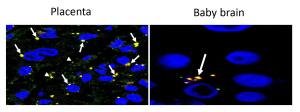Case Study Shows COVID-19 Can Be Transmitted from Mother to Baby through Placenta, Causing Brain Injury
Maternal infections caused seizures, developmental delays and other health issues in two newborns.

Researchers at UHealth – University of Miami Health System and the University of Miami Miller School of Medicine have shown that, in two cases, COVID-19 infection breached the placenta and caused brain damage in the newborn.
While admitted to the Neonatal Intensive Care Unit (NICU) at Holtz Children’s Hospital at the University of Miami/Jackson Memorial Medical Center, a teaching hospital affiliated with UHealth and the Miller School, both infants had tested negative for the virus at birth, but had significantly elevated SARS-CoV-2 antibodies detectable in blood, indicating that either antibodies crossed the placenta, or passage of the virus occurred and the immune response was the baby’s.
Both infants experienced seizures, small head sizes and developmental delays, and one infant died at 13 months of age. The study, titled “Maternal SARS-CoV-2, Placental Changes and Brain Injury in Two Neonates,” was published April 6 in the journal Pediatrics. This is the first study to confirm cross-placental SARS-Cov-2 transmission leading to brain injury in the newborn.

“Many women are affected by COVID-19 during pregnancy, but to see these kinds of problems in their infants at birth was clearly unusual,” said Shahnaz Duara, M.D., professor of pediatrics at the Miller School of Medicine, medical director of the NICU at Holtz Children’s Hospital and senior author on the study. “We’re trying to understand what made these two pregnancies different so we can direct research toward protecting vulnerable babies.”
Early during the COVID-19 pandemic, this group of neonatologists had observed transient lung disease and sometimes blood pressure issues among newborns who had similarly tested negative at birth but were born to COVID-19 positive mothers. This hinted at infection but left unclear whether the problems were caused by inflammatory placental cytokines or whether the SARS-CV-2 virus crossed the placenta and injured the baby.
“If we saw a baby who presented this way, we would call it hypoxic ischemic encephalopathy [brain damage caused by decreased blood flow],” said Michael Paidas, M.D., professor and chair of the Department of Obstetrics, Gynecology and Reproductive Sciences at the Miller School and Jackson’s chief of service for obstetrics and gynecology. “But it wasn’t lack of blood flow to the placenta that caused this. As best we can tell, it was the viral infection.”
Hypoxic ischemic encephalopathy in newborns, by definition, requires a sentinel event in the mother during labor prior to detecting neurological injury in the newborn at birth.
Signature Placental Changes Caused by SARS-CoV-2
Ali G. Saad, M.D., a Miller School professor, neuropathologist and director of the pediatric and perinatal pathology service at Holtz Children’s Hospital, examined both placentas and found signature placental pathological changes caused by SARS-CoV-2 in both, and also examined major changes in the brain that came to autopsy.
“I was struck by the unexplained severity of the loss of the white matter and the presence of features of hypoxia/ischemia in the cerebral cortex,” Dr. Saad said. “We became suspicious that the virus somehow managed to breach the placental barrier to damage the central nervous system, but this had not been documented before.”

Along with Dr. Paidas, Arumugam Jayakumar, Ph.D., a neuroscientist and molecular biologist in the Department of Obstetrics, Gynecology and Reproductive Sciences, showed the presence of virus in both patients’ placentas and also in the brain of the infant who died. Analysis of both placentas clearly demonstrated severe inflammatory changes in each. Also striking was the absence of a critical placental hormone — human chorionic gonadotrophin — which, while essential for all fetal development, is particularly important for brain development.
The authors stress that these were rare occurrences. UHealth and Miller School clinicians have seen hundreds of pregnant women and delivering mothers with COVID-19 positivity; however, these were the only two women whose babies experienced the devastating brain injuries described in the paper. In both cases, the mothers contracted the infection in their second trimesters and subsequently cleared it, but one had a repeat infection in her third trimester, suggesting that an unusual maternal and/or fetal immune response to the virus may have played a role.

“We need to continue our research to figure out why these two babies experienced such devastating results,” said Merline Benny, M.D., assistant professor of pediatrics, a neonatologist and first author on the paper. “Once we fully understand the causes, we can develop the most appropriate interventions.”
The interdisciplinary team of researchers also included pediatric neurologist Roberto Lopez, M.D., and pediatric radiologist and neuroimaging expert Gaurav Saigal, M.D., chief of the neuroradiology section at the Miller School. The team of physicians and scientists hopes that their cases will alert obstetricians and pediatricians and create awareness of the potential dangers of maternal COVID-19 to newborns; hitherto, the data have suggested a relatively benign course in infants who test negative after birth. The next step that interests the group is potentially identifying biomarkers to select babies most at risk.
For concerned parents, the authors recommend maternal pre-pregnancy or pregnancy maternal COVID-19 vaccination as the first line of defense; breastfeeding; masking if actively infected; and other precautionary actions.
The study adds to continuing research from the Miller School’s Mother-Baby COVID-19 Project, led by Dr. Paidas and associates, which examines the virus’ impact on pregnant mothers and infants.
Tags: COVID-19, Department of Obstetrics Gynecology and Reproductive Sciences, Department of Pediatrics, Dr. Michael Paidas, Dr. Shahnaz Duara, Holtz Children's Hospital, neonatology, pregnancy


